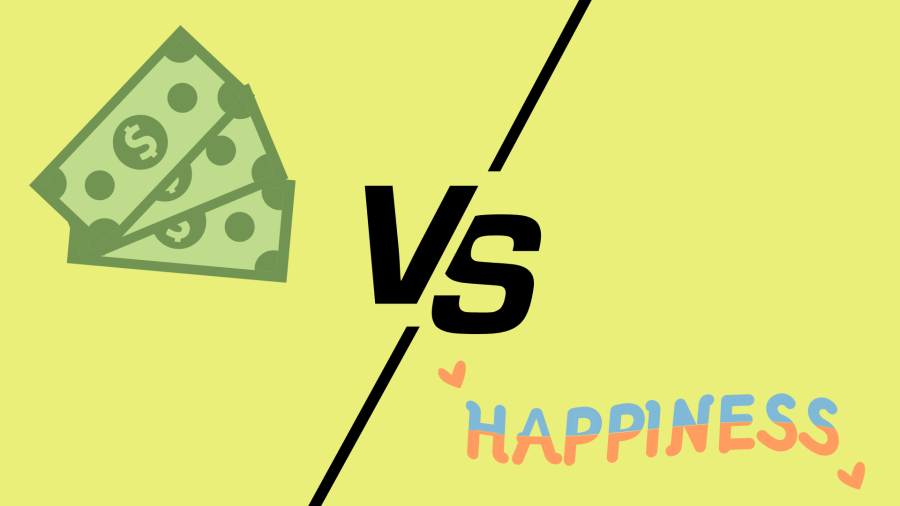Head 2 Head

All that glitters is not gold. The best things in life are free. When you have no money, you have no problems. All of these sayings convey the basic principle of “money cannot buy happiness.” However, I would like to contradict that statement to say that money can indeed give you happiness.
In 2010, a study researchers Daniel Kahneman and Angus Deaton conducted a study regarding if money had any correlation with happiness. The study supported the idea that money was correlated with life satisfaction. However, this study only said that the effects of an increase up to a threshold of $75,000 dollars annually.
In 2021, a new study against the old 2010 study found that there was not a threshold. Researcher Matthew A. Killingsworth had re-done the study and found evidence that there is not an actual threshold where money does not stop increasing life satisfaction. The effects of money on life satisfaction seemed to exponentially go up with the salary increase.
This was seen in 1.7 million reports that both experienced well-being increased linearly, or that when income increased, so did well-being. The study was performed by having a group of adults set a time they woke up and went to bed, then at points between those times a survey would randomly pop up asking questions about life satisfaction at the specific moment. Factors like negative and positive emotions are both present and accounted for in the polling. The final results of the poll in this study show that the more money one has, the higher they perceived their happiness.
If you have any hobbies, and find those hobbies fun, guess what those cost? Money! If you do not have money, you cannot fund your ventures in that hobby. You can apply that logic to anything in life.
If you enjoy expensive food, you need one major thing for it. Money! If you want to go anywhere in a car, you have to get gasoline or electricity to fuel it, but fuel is not free. Food, fuel, and hobbies all contribute to one’s quality of life.
Typically, the higher one’s quality of life, the happier one is. The contributing factor to the quality of life is money! Money is the fuel for your quality of life, and you cannot change your quality of life without more money.
On a country scale, the quality of life correlates with the happiness ratings in the world. Some examples of this being true are Afghanistan with its extremely low quality of life and happiness ratings, and Finland having an extremely high quality of life and an equally high happiness rating. These countries further prove that money and happiness have a correlation.
Whether on a personal scale of one’s salary, or on a country scale with a correlation of high quality of life and high happiness, no matter how you spin it, money is a serious factor of happiness to account for.
Money cannot buy happiness. Happiness is a genuine feeling, and nothing can be purchased in exchange for it.
Studies have been completed on whether or not money can buy happiness. When looking at income, it can be said that money may have an effect on your happiness, but not past a $75,000 threshold. That threshold is considered a financially secure point.
In 2022, a San Francisco State University study found, “when we actively and tangibly need it for our survival, obtaining money is very rewarding. But when we go beyond that point, when we’re ‘financially secure’ as they say, money can still be rewarding, but its power to make you happy is significantly reduced.”
Some could argue money buys things that can make you happy. Humans tend to choose feelings based on external things. You are in control of what you choose makes you happy. The chances of you choosing money makes you happy fade over time.
The brain naturally always wants to climb for higher, better levels, something that triggers higher levels of dopamine. When you eventually decide money no longer makes you happy along with other external things, you will look for something inside of you.
If you have chased money for so long, you are not able to find something to give you natural happiness on the inside. You will become unhappy, that is, until you find something of value on the inside. You simply cannot purchase an emotion.
Humans chase better. We spend much of our lives wanting better, though there is significance in what you already do have. While the $75,000 threshold of money and happiness meeting could be argued, no matter rich or poor the human brain will always want superior. You will never be fully happy or content with money.
True happiness comes from human connection. Money has never before and never will buy anything close to the feeling of human connection. Human connection is so important, Robert Waldinger, psychiatrist of Massachusetts General Hospital and a professor of psychiatry at Harvard Medical School said, “Loneliness kills. It’s as powerful as smoking or alcoholism.”
Waldinger, who led a Harvard study on the stem of happiness found that “close relationships, more than money or fame, are what keep people happy throughout their lives, the study revealed.”
Money is an inadequate source of happiness. Nothing you buy can make you feel a natural feeling, but connections can bring happinesses that humans strive for.


